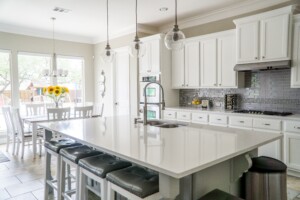
Along with all the other rooms in the house, there has certainly been a lot written about what kind of Feng Shui impact the kitchen has on its occupants. Many myths abound and I have had clients needlessly worry about features in their kitchens, some of which will be addressed in this article.
Firstly, the residential kitchen is NOT normally looked upon as the most important room in a house. In fact, with the way we live today, fewer people actually cook on a daily basis. There may even be an ironic parallel between how high-tech and ostentatious a kitchen is, with how little cooking actually take place.
And yet it is one of the more important rooms in the house which could make or break a real estate deal. Here are some of the more popular kitchen myths: (READ: not true)
o A mirror behind a stove brings prosperity: I have walked into kitchens where clients had propped up make-ups mirrors behind their stove burners or had placed one large mirror propped up or attached to the wall because they had heard that this brings in more money. Aside from the fact that grease and food will splatter onto the mirror and look bad, I don’t recommend this practice. This notion has something to do with creating the illusion that the more food you are cooking, the wealthier you are. Nice concept, but not very effective. Rather, if you really want to be “spiritually” rich, it would probably be better to pack an extra lunch each day and then give it away to the first homeless person you see.
o A sink placed right near a stove, or a refrigerator right near a stove, is bad Feng Shui: this is very intangible. And I would not argue with a kitchen designer about the most functional placement of appliances. The Feng Shui myth is that hot and cold (stove/refrigerator) should not be placed side by side because it would be a conflict of the yin-yang energies.
None of the authors who claim this is a problem have given information about what the measurable consequences are when stove and fridge are next to each other. Not worth worrying about.
o When a person stands at a stove and cooks with their back to the entrance, this is seen as vulnerable or prone to accidents. I can see some truth to this, although I have never in all my years of practice heard a client blame a kitchen accident on their having their back to the entrance. (And since mothers supposedly “have eyes on the backs of their heads,” this should be a mute point for a large percentage of the people who cook in the family kitchen.)
o Kitchen in the center of the house is bad luck: This seems to simply be a poor design and possibly more prone to a fire. It is more practical for a kitchen to be on the side of a house where there can be a window for direct escape of cooking odors, excessive heat or steam.
o Bathrooms next to kitchens are bad Feng Shui: This misconception is hinged on the notion that there could be a sanitation problem by having “elimination” energies in close proximity to a food prep location. Just remember that you can walk across a whole house with unwashed hands and end up in the kitchen also.
Now for some of my consistent findings, using traditional Feng Shui: when a kitchen ends up being in the most positive area of the house, the client often reports that this is in fact the favorite hang-out place for occupants as well as guests. Conversely, when a kitchen is located in a particularly accident-prone area of the house, there are more injuries and/or appliances break down more often. For flying star fans, this may be where the infamous 5 star resides.
Another consistent finding: when the kitchen resides in the Northwest sector of the house (NW=metal and cooking produces fire), the result of fire energetically melting metal can create a home where the children are unruly and do not listen to the father. (NW is associated with the father figure.) There is no physical explanation for this, but the feedback supports this association.
A commercial kitchen in a restaurant or catering company should be in a positive location within the building because the success of the business is based so much on the food.
Finally, we are all psychological and programmable beings. When people enter the house from the kitchen, there seems to be a common reaction that the occupants will feel like eating whether they are hungry or not. One general truth is that there is no perfect or singular color for a kitchen to have good feng shui. I get asked all the time about kitchen surfaces and cabinetry. The ultimate color decision could easily have to do with the location of the kitchen in the house and when the whole house was built.
That said, the modern kitchen includes a lot of earthen surfaces and metal appliances and that may over ride any color choices related to the wood or water elements. The stove and oven will produce real heat (fire element) when cooking and that may still be the most powerful element to consider.
Author: Kartar Diamond
Company: Feng Shui Solutions ®
From the Myths & Superstitions Blog Series
